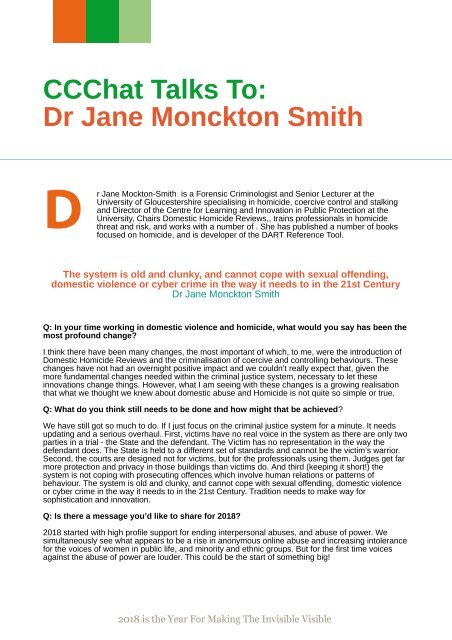CCChat-Magazine_5
You also want an ePaper? Increase the reach of your titles
YUMPU automatically turns print PDFs into web optimized ePapers that Google loves.
<strong>CCChat</strong> Talks To:<br />
Dr Jane Monckton Smith<br />
D<br />
r<br />
Jane Mockton-Smith is a Forensic Criminologist and Senior Lecturer at the<br />
University of Gloucestershire specialising in homicide, coercive control and stalking<br />
and Director of the Centre for Learning and Innovation in Public Protection at the<br />
University, Chairs Domestic Homicide Reviews,, trains professionals in homicide<br />
threat and risk, and works with a number of . She has published a number of books<br />
focused on homicide, and is developer of the DART Reference Tool.<br />
The system is old and clunky, and cannot cope with sexual offending,<br />
domestic violence or cyber crime in the way it needs to in the 21st Century<br />
Dr Jane Monckton Smith<br />
Q: In your time working in domestic violence and homicide, what would you say has been the<br />
most profound change?<br />
I think there have been many changes, the most important of which, to me, were the introduction of<br />
Domestic Homicide Reviews and the criminalisation of coercive and controlling behaviours. These<br />
changes have not had an overnight positive impact and we couldn’t really expect that, given the<br />
more fundamental changes needed within the criminal justice system, necessary to let these<br />
innovations change things. However, what I am seeing with these changes is a growing realisation<br />
that what we thought we knew about domestic abuse and Homicide is not quite so simple or true.<br />
Q: What do you think still needs to be done and how might that be achieved?<br />
We have still got so much to do. If I just focus on the criminal justice system for a minute. It needs<br />
updating and a serious overhaul. First, victims have no real voice in the system as there are only two<br />
parties in a trial - the State and the defendant. The Victim has no representation in the way the<br />
defendant does. The State is held to a different set of standards and cannot be the victim’s warrior.<br />
Second, the courts are designed not for victims, but for the professionals using them. Judges get far<br />
more protection and privacy in those buildings than victims do. And third (keeping it short!) the<br />
system is not coping with prosecuting offences which involve human relations or patterns of<br />
behaviour. The system is old and clunky, and cannot cope with sexual offending, domestic violence<br />
or cyber crime in the way it needs to in the 21st Century. Tradition needs to make way for<br />
sophistication and innovation.<br />
Q: Is there a message you’d like to share for 2018?<br />
2018 started with high profile support for ending interpersonal abuses, and abuse of power. We<br />
simultaneously see what appears to be a rise in anonymous online abuse and increasing intolerance<br />
for the voices of women in public life, and minority and ethnic groups. But for the first time voices<br />
against the abuse of power are louder. This could be the start of something big!<br />
2018 is the Year For Making The Invisible Visible


















